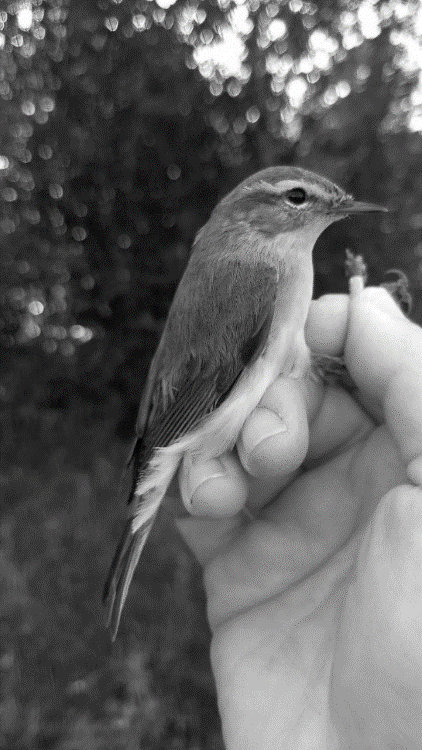Two birds, both willow warblers. Ringed on the same day, but 500 miles apart. One on the Isle of Arran, where it probably bred, the other in one of our village scrub patches as it stopped to rest and feed on its migration to central Africa.
As this is only a small bird (about 8g in weight – a tad more than three to a 20p coin) it wears out two sets of feathers each year flying to Africa and back. It feeds on small insects like aphids in the treetops, so is not always easy to see. But its liquid, cascading song is commonplace in the north where most of the UK population now breeds. Like many other summer migrants, their breeding range is steadily moving north for a variety of reasons. Not least of these is the disappearance of scrubland like that where the bird on the left was ringed. Scrub can still be found in villages around Maidstone, although it’s often considered ‘waste ground’ by planners and developers and is targeted for housing.
There was plenty of it about in the time of Gilbert White, a Hampshire parson who wrote ‘The Natural History of Selborne’. Selborne is worth a visit as Captain Oates of “I’m just going outside, I may be some time” fame was born there and has museums to both. One of White's many claims to fame in an age before telescopes and David Attenborough documentaries was to identify the willow warbler as a different species from the almost identical looking wood warbler and chiffchaff. Up to then they had all been known as willow wrens.
Our remaining scrubby areas, therefore, be they an overgrown orchard, or an overlooked plot of land of the edge of our village, are high quality habit for flora and fauna. But change is on the way - not just to meet our greed for land, but because of the climate emergency. If willow warblers fly the thousands of miles to Africa only to find their wintering quarters destroyed, they won’t be coming back here - but we can be sure the destruction will be driving the local human population in our direction.
The latest IPCC report on the climate emergency was frightening. It was a “wake up call for humanity” said the Prime Minister, who appears to have promptly turned over and gone back to sleep. Imagine a village with no birdsong. We still need it - if only to cover up the snoring of politicians.









Make A Comment
Comments (0)